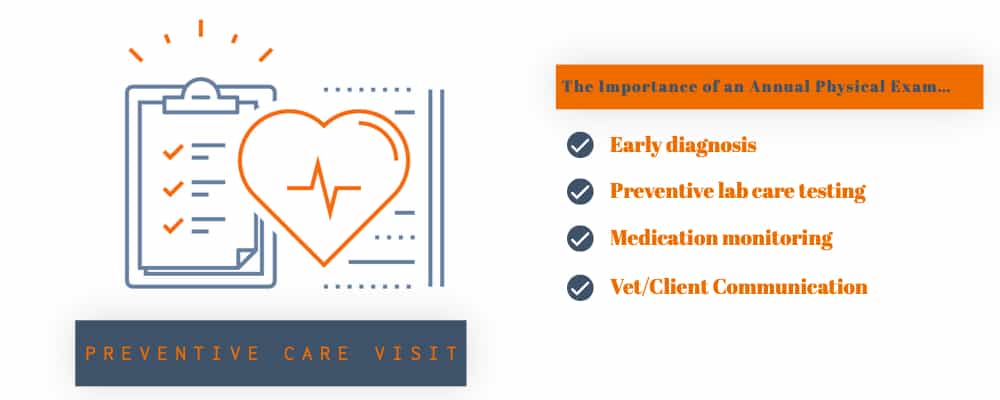Pre•ven•tive
- Designed to keep something undesirable such as illness, harm, or accidents from occurring.
- A medicine or other treatment designed to stop disease or ill health from occurring.
Why A Checkup?
A yearly veterinary checkup is the best way to keep your pet as healthy as possible – because it’s much easier to prevent disease than to treat it.
So, whether your dog frolics at the park with all the neighborhood pups, or the closest your cat gets to the great outdoors is a sunny windowsill, every pet needs to see their veterinarian – at least once a year!
Remember: Pets age faster than we do, so missing even one yearly checkup can be like us not visiting a doctor for over five years!
The Importance of an Annual Physical Exam…
The importance of an annual physical examination is the same for your pet as it is for you — dogs and cats age 4 to 7 times faster than human beings, so for a cat or dog to have an annual physical exam is like us going to see the doctor once every 4 to 7 years. A lot can happen in that period of time.
During each preventive care exam we evaluate 16 body systems, looking for changes that would be difficult for most pet owners to detect, such as heart murmurs, abdominal masses and dental problems. The evaluation of the different body systems may include laboratory testing and other diagnostic workups. Some of the most common tests that may be performed are checking a stool sample for parasites, examining the urine, drawing the blood for chemistry evaluation, and cell counts. The sooner we detect problems, the better we are able to manage them.
Early Diagnosis
Early diagnosis of disease will help your pet remain healthy — You may think you notice every little thing your pet does – but did you know that dogs and cats have evolved to hide illness? Showing weakness makes an animal – and their pack – vulnerable, so our best friends do everything they can to keep a stiff upper lip. Your veterinarian can find problems your pet hides – another reason why annual checkups are so important!
If you notice any of the following in your pet, please ask your veterinarian for advice:
- Abnormal behavior, sudden viciousness or lethargy
- Change in appetite that lasts a few days (this can include an increase or decrease in appetite)
- Abnormal discharge from nose, eyes, or other body openings
- Excessive head shaking, scratching or licking
- Foul breath or excessive tartar and deposits on teeth
- Abnormal lumps, limping, or difficulty in getting up or laying down
Preventative Lab Care Testing
The history and physical exam are very important aspects of patient monitoring and diagnosis, but lab work gives us information that we cannot otherwise detect. Even in the apparently healthy pet, diseases may be in the early stages and they cannot be recognized without appropriate lab tests. There are 5 main types of early detection lab tests:
- Intestinal Parasite Exam –is recommended annually on every adult pet to screen for intestinal parasites such as hookworm, roundworm, whipworm and tapeworm. These parasites are common in our subtropical environment. A separate test should be run on each individual pet. Random samples from the yard or a litter box are not optimal.
- Heartworm exam – for dogs, an annual heartworm blood test is required to monitor for the presence of heartworms. Even dogs on heartworm prevention need to be monitored as heartworm prevention is not 100% effective.
- Early Detection Profiles – These profiles are a package of lab tests that allow us to establish and verify your pet’s normal blood values, detect the onset of diseases before the physical symptoms appear, and make sure your pet’s internal organ systems are healthy. They include a Complete Blood Count (CBC), a basic Chemistry Panel and the Intestinal Parasite Exam. For dogs, it includes the Heartworm Exam, and for cats in includes a Thyroid Screen. It can also help us watch for side effects due to medication like NSAIDs and can serve as pre-anesthetic lab work required for surgery, dentistry or other procedures.
- Comprehensive Lab Profiles – these are a more extensive series of tests that are always recommended for senior pets, but can be done on younger adult pets as well if circumstances warrant. They include a Complete Blood Count (CBC), a Comprehensive Chemistry Panel, Thyroid Screen, Urinalysis and the Intestinal Parasite Exam. For dogs it includes the Heartworm Exam.
- Chronic medication monitoring– this includes annual blood level testing for drugs such as Thyroid tabs, Phenobarbital and Potassium Bromide, and chemistry profiles for drugs like NSAIDs.
Other Ways to Prevent Disease
- Maintain clean teeth with home dental care and professional dental cleanings
- Use medications to prevent parasites such as heartworm, fleas, intestinal parasites and ticks
- Keep your pet at a healthy body weight.
If it has been a while since your pet had a preventive care exam, give us a call so we can get caught up and make sure that your pet is as healthy as it can be
